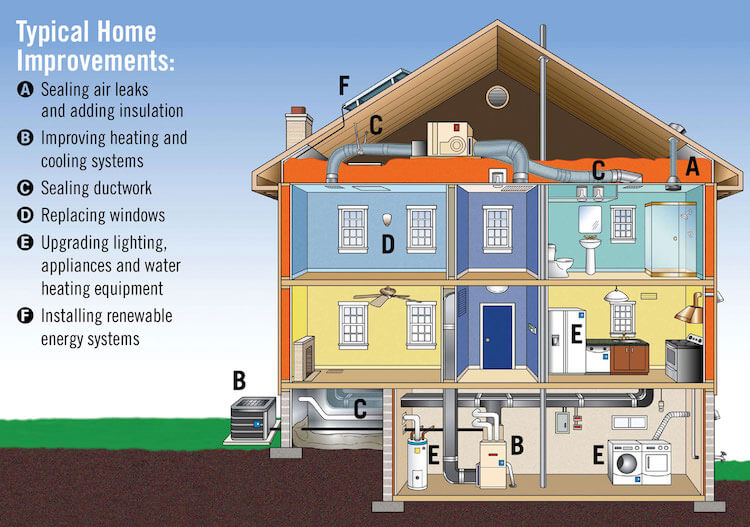
Sustainable Living on a Budget: Eco-Friendly Homebuilding Tips for Everyday Americans
Going green shouldn’t come with a greenbacks warning. Whether you’re building your dream home or embarking on a renovation adventure, incorporating sustainable practices doesn’t have to break the bank. In fact, many eco-friendly choices can save you money in the long run! This guide is designed to give you practical tips for building an eco-friendly home without sacrificing your budget.
Embrace “Think Small, Live Large”
The size of your home directly impacts its environmental footprint. Opting for a smaller space reduces construction materials, heating and cooling costs, and overall resource consumption. Consider multi-functional furniture, utilizing natural light, and creating open floor plans to maximize the feeling of space in a smaller footprint. Remember, happiness doesn’t depend on square footage!
Befriend the Sun: Passive Design Hacks
Harness the power of the sun for free heating and cooling! Utilize passive solar design principles: south-facing windows for winter heat gain, strategically placed overhangs for summer shade, and thermal mass materials like concrete floors to store and release warmth. This can significantly reduce your reliance on conventional HVAC systems, saving you money and energy.

Material Matters: Choose Wisely
When selecting building materials, prioritize sustainability and local sourcing. Recycled materials like reclaimed wood, salvaged bricks, and even repurposed shipping containers can add character and reduce resource depletion. Look for certified sustainable wood (FSC) and insulation made from recycled materials like denim or cellulose. By supporting local suppliers, you minimize transportation emissions and promote community-based businesses.
DIY: Sweat Equity Saves Money and the Planet
Tackle smaller projects yourself! Learn basic carpentry skills to build shelves, install energy-efficient fixtures, or repair leaky faucets. Not only does this empower you to customize your space, but it saves on labor costs and reduces reliance on professionals. Online resources and workshops abound, so don’t be afraid to embrace your inner handyman (or woman)!
Water, Water Everywhere:
Conserving water is crucial for sustainability. Install low-flow faucets and showerheads, repair leaks promptly, and consider water-efficient appliances. Harvest rainwater in barrels for non-potable uses like watering plants or washing your car. By reducing water consumption, you save money on bills and minimize pressure on precious water resources.
Let There Be (Energy-Efficient) Light:
Upgrade your lighting to LED bulbs, which use 75% less energy and last 25 times longer than traditional incandescent bulbs. Install dimmer switches to adjust lighting levels and promote energy savings. Consider skylights or strategically placed windows to maximize natural light during the day.
Appliance Efficiency is Key:
Look for Energy Star certified appliances when replacing old ones. While the initial cost might be slightly higher, the energy savings over their lifespan translate to significant financial and environmental benefits. Choose right-sized appliances – a giant refrigerator for a single person is an energy guzzler!
Embrace Nature’s Insulation:
Plant trees and native landscaping around your home. Trees provide shade, reduce wind chill in winter, and absorb heat in summer, contributing to natural temperature regulation. This reduces your reliance on heating and cooling systems, saving you money and creating a more pleasant microclimate around your home.

Get Composting!
Transform food scraps and yard waste into nutrient-rich compost for your garden. This reduces landfill waste, promotes healthy soil, and nourishes your plants with natural fertilizer. Composting is simple, affordable, and a fantastic way to give back to the earth.
Beyond the Build: Sustainable Habits Matter
Remember, sustainability is a continuous journey, not just a destination. Foster eco-friendly habits in your daily life:
- Use reusable water bottles and grocery bags.
- Opt for eco-friendly cleaning products.
- Air-dry clothes instead of using a dryer.
- Utilize public transportation, bike, or walk whenever possible.
- Reduce, reuse, and recycle everything you can.
Seek Incentives and Grants:
Many government programs and organizations offer financial incentives for sustainable building practices. Research available grants, tax credits, and rebates to offset the cost of eco-friendly materials and technologies. Don’t hesitate to explore!
Building a greener future starts with informed choices, even on a budget. By incorporating these tips and fostering sustainable habits, you can create a comfortable, cost-effective, and environmentally friendly home that reflects your values and contributes to a healthier planet for everyone.
Remember, small changes add up to big impacts. Start your eco-friendly journey today!

